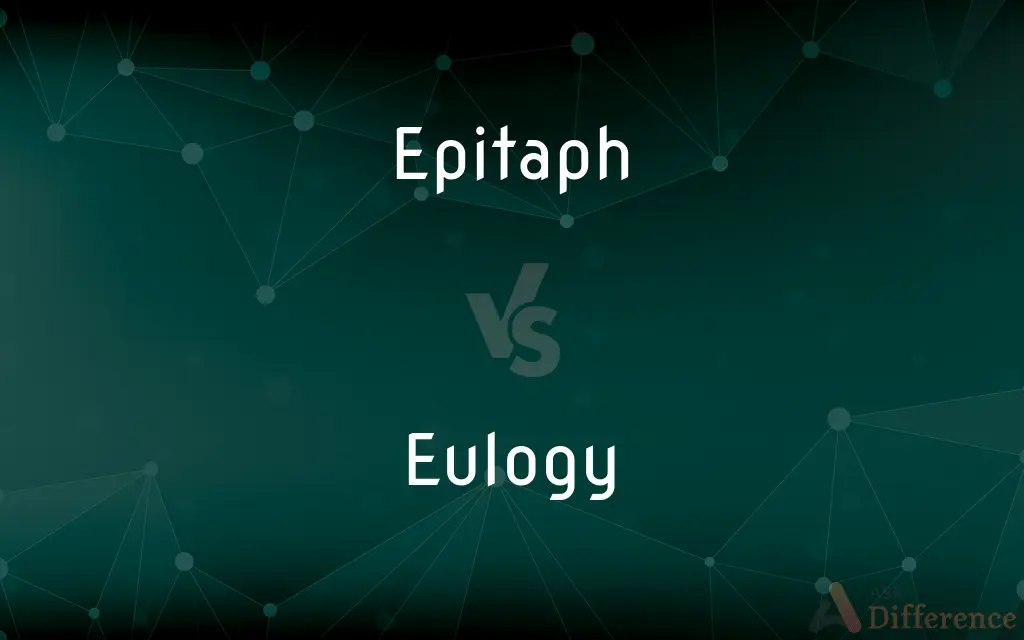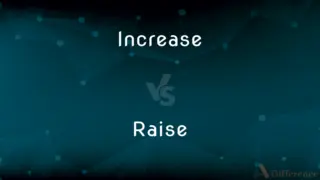Epitaph vs. Eulogy — What's the Difference?
By Urooj Arif & Fiza Rafique — Updated on April 5, 2024
An epitaph is a brief phrase or inscription on a tombstone honoring the deceased, while a eulogy is a speech or written tribute praising someone's life, often given at funerals.

Difference Between Epitaph and Eulogy
Table of Contents
ADVERTISEMENT
Key Differences
An epitaph serves as a lasting tribute inscribed on a gravestone, offering a short, poignant reflection or summary of the deceased's life or beliefs. It's concise, intended for public display, and often encapsulates the essence of the person's legacy in just a few words. In contrast, a eulogy is a more detailed and personal tribute, typically delivered verbally during a funeral or memorial service. It celebrates the life, achievements, and qualities of the deceased, often including personal stories, reflections, and memories shared by the speaker, who is usually a close friend, family member, or clergy.
While epitaphs are permanent markers that provide a brief homage or insight into the deceased's identity or values, eulogies play a crucial role in the grieving process, allowing for a shared communal expression of loss and celebration of the person's life. The epitaph's brevity contrasts with the eulogy's depth, the latter offering a comprehensive narrative that captures the essence of the deceased's impact and persona.
Epitaphs, due to their public and lasting nature, are carefully chosen to convey a lasting message or sentiment that reflects the deceased's spirit or the bereaved's final words of remembrance. Eulogies, however, can be more flexible and personal, providing a platform for expressing grief, admiration, and love, often helping those in mourning find solace and closure.
The crafting of an epitaph is a thoughtful process aimed at encapsulating a life's worth of experiences into a few memorable words, a testament to the individual's legacy or the impact they left on their loved ones. Eulogies, by their nature, are more immediate and serve as a key component of the mourning process, a verbal homage that articulates the void left by the departed and celebrates their life's story.
Comparison Chart
Definition
A brief phrase or inscription on a tombstone.
A speech or written tribute about someone who has died.
ADVERTISEMENT
Purpose
To summarize or honor the deceased's life or values.
To praise and celebrate the life of the deceased.
Length
Short, often just a sentence or two.
Can be several minutes long, involving detailed stories.
Presentation
Inscribed on gravestones for public view.
Delivered verbally at funerals or memorial services.
Content
Often contains a summary, farewell, or a personal motto.
Includes personal stories, achievements, and qualities.
Compare with Definitions
Epitaph
May reflect a person's beliefs, humor, or philosophy.
His epitaph, A Free Spirit Forever Soaring, perfectly captured his adventurous life.
Eulogy
Often includes anecdotes, personal memories, and the deceased's impact on others.
The eulogy was filled with humorous and touching stories that celebrated his life.
Epitaph
Sometimes includes dates of birth and death, reflecting the person's life span.
The epitaph included his birth and death years, marking the time he shared with the world.
Eulogy
Serves as a form of closure for the bereaved, celebrating the essence of the deceased.
Giving the eulogy, he shared moments that encapsulated her generosity and spirit.
Epitaph
Offers a lasting tribute for future generations to remember.
The family chose an epitaph that expressed gratitude for her inspiring legacy.
Eulogy
Can be written and published as a tribute.
The published eulogy in the newspaper highlighted his contributions to the community.
Epitaph
Can also refer to a brief literary piece commemorating someone deceased.
She wrote a poignant epitaph for her late mentor, capturing his wisdom and kindness.
Eulogy
A speech given at a funeral to praise and remember the deceased.
Her eulogy moved everyone to tears, beautifully recounting her mother's life and love.
Epitaph
A short text honoring the deceased, inscribed on their tombstone.
The epitaph Loving Father, Devoted Husband, Cherished Friend adorned his tombstone.
Eulogy
Reflects on the virtues, achievements, and significance of the person's life.
The eulogy painted a vivid picture of her remarkable journey and the lives she touched.
Epitaph
An epitaph (from Greek ἐπιτάφιος epitaphios "a funeral oration" from ἐπί epi "at, over" and τάφος taphos "tomb") is a short text honoring a deceased person. Strictly speaking, it refers to text that is inscribed on a tombstone or plaque, but it may also be used in a figurative sense.
Eulogy
A eulogy (from εὐλογία, eulogia, Classical Greek, eu for "well" or "true", logia for "words" or "text", together for "praise") is a speech or writing in praise of a person or persons or things, especially one who recently died or retired or as a term of endearment.Eulogies may be given as part of funeral services. In the US, they take place in a funeral home during or after a wake; in the UK they are said during the service, typically at a crematorium or place of worship, before the wake.
Epitaph
An inscription on a tombstone in memory of the one buried there.
Eulogy
A laudatory speech or written tribute, especially one praising someone who has died.
Epitaph
A brief literary piece commemorating a deceased person.
Eulogy
High praise or commendation.
Epitaph
An inscription on a gravestone in memory of the deceased.
Eulogy
An oration to honor a deceased person, usually at a funeral.
Epitaph
A poem or other short text written in memory of a deceased person.
Eulogy
Speaking highly of someone or something; the act of praising or commending someone or something.
Epitaph
(intransitive) To write or speak after the manner of an epitaph.
Eulogy
A speech or writing in commendation of the character or services of a person; as, a fitting eulogy to worth.
Eulogies turn into elegies.
Epitaph
(transitive) To commemorate by an epitaph.
Eulogy
A formal expression of praise
Epitaph
An inscription on, or at, a tomb, or a grave, in memory or commendation of the one buried there; a sepulchral inscription.
Hang her an epitaph upon her tomb.
Epitaph
A brief writing formed as if to be inscribed on a monument, as that concerning Alexander: "Sufficit huic tumulus, cui non sufficeret orbis."
Epitaph
To commemorate by an epitaph.
Let me be epitaphed the inventor of English hexameters.
Epitaph
To write or speak after the manner of an epitaph.
The common in their speeches epitaph upon him . . . "He lived as a wolf and died as a dog."
Epitaph
An inscription on a tombstone or monument in memory of the person buried there
Common Curiosities
How do you choose the right words for an epitaph?
Choosing an epitaph involves reflecting on the deceased's personality, beliefs, and what message they or their loved ones want to leave behind as a legacy.
Who typically writes an epitaph?
Epitaphs are usually chosen or written by close family members or by the deceased before their passing.
Is it common for epitaphs to include quotes or sayings?
Yes, epitaphs often include meaningful quotes, sayings, or even excerpts from religious texts that reflect the deceased's life or beliefs.
Can a eulogy be delivered for someone who is still alive?
While traditionally for the deceased, "living eulogies" are given in situations where people want to express their feelings and appreciation for someone before they pass.
What role does a eulogy play in a funeral?
A eulogy plays a central role in funerals, helping mourners remember and celebrate the deceased's life and start the healing process.
Can anyone deliver a eulogy?
Yes, eulogies can be delivered by family members, friends, colleagues, or clergy, anyone who was close to the deceased or chosen by the family.
How long should a eulogy be?
Eulogies typically last between 5 to 10 minutes, but there's no strict rule. The length can vary based on the speaker's preference and the context of the service.
What makes a good eulogy?
A good eulogy is heartfelt, personal, and reflective of the deceased's life, achievements, and impact on others, often including both humorous and poignant elements.
Are epitaphs only for gravestones?
While epitaphs are primarily for gravestones, the term can also refer to literary pieces that commemorate someone deceased.
Can a eulogy include criticisms or negative aspects of the deceased's life?
While honesty is important, eulogies typically focus on celebrating and remembering the positive aspects of the deceased's life, providing comfort to the bereaved.
Share Your Discovery

Previous Comparison
Goal vs. Accomplishment
Next Comparison
Increase vs. RaiseAuthor Spotlight
Written by
Urooj ArifUrooj is a skilled content writer at Ask Difference, known for her exceptional ability to simplify complex topics into engaging and informative content. With a passion for research and a flair for clear, concise writing, she consistently delivers articles that resonate with our diverse audience.
Co-written by
Fiza RafiqueFiza Rafique is a skilled content writer at AskDifference.com, where she meticulously refines and enhances written pieces. Drawing from her vast editorial expertise, Fiza ensures clarity, accuracy, and precision in every article. Passionate about language, she continually seeks to elevate the quality of content for readers worldwide.
















































